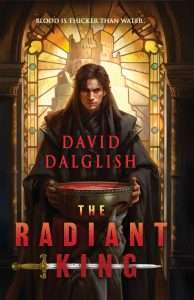REVIEW: The Radiant King by David Dalglish
David Dalglish’s The Radiant King presents a unique premise and follows through with intricate world-building, relentless actions, sick twists, and a somewhat sobering reflection on the toll immortality takes. With a ballsy ending and a plot that explodes, The Radiant King is an immensely promising start to a new series.
“I am Sariel, ever-living child of Kaus. I am no creature, no beast, no monster.”
The Radiant King has an undeniably cool premise: six immortal siblings, five are sworn to peace; one wants a crown. These six siblings have been around for thousands of years, watching humans make mistakes and living in their midsts. Periodically, one of the siblings will tap out and commit suicide, which causes them to go into a comatose state until their body can heal.
 We start with one of the siblings, Faron, waking up from one of these events. His human lover has died, as they do, and he’s elected to let the pain fade with time.
We start with one of the siblings, Faron, waking up from one of these events. His human lover has died, as they do, and he’s elected to let the pain fade with time.
When he awakes, he learns that one of his siblings has broken their mantra. The six ever-living siblings in The Radiant King have two core rules: no crowns, and no giving Radiance to humans. Eder has broken both of these rules. With his brooding, cynical brother Sariel, Faron sets out to join a war with the intent of helping the war-front to take down Eder.
The world-building of The Radiant King I just adored. That premise grabs me, and Dalglish adds just enough introspection and melancholic musing to bring the Faron, Sariel, and Eder to life. Then we have some really excellent lore details. For example, humans live in a constant state of reincarnation. When one dies, they are reborn with only the faint echoes of memories of past lives. One of the ever-living siblings is in love with a human. Sometimes he tracks her down and they live a full life together, sometimes not. Details like that will make The Radiant King stick in my mind for a long time.
The plot is just as good as the world-building. We have crusades, mysteries, side-plots, torture cults, and long buried blood feuds. There’s many threads going on, but Dalglish has a firm hand on all of them. The narrative can be confusing, but never confused. I can’t go into much detail without spoilers, but if you’re a fan of Kallor’s POVs in Malazan, Covenant of Steel by Anthony Ryan or Castlevania, The Radiant King is going to be in your wheelhouse.
“No crowns. No thrones.”
Both the action and the prose in The Radiant King is serviceable. There’s moments of greatness, including a castle raid of nightmares, but for the most part, it’s good, if at times familiar. It kept my attention well, especially once I got about halfway.
My biggest critique of this book lies in the side characters. While Sariel, Eder, and Faron often feel nuanced and intriguing, the other characters–regardless of their amount of screentime–felt one-note and essentially like characters instead of people. Their dialogue, as a result, doesn’t always feel alive.
My remaining complaint of The Radiant King is the pacing feels off in the beginning. Getting through the first chunk wasn’t a chore, but the back-half is significantly better.
With those complaints mentioned, I do still highly recommend this for readers whose primary interest in fantasy books is plot or world-building centric. There’s tons of great stuff in The Radiant King, and the ending is one that blew my mind with its moxie. I’ll be waiting for book two with great anticipation.
Read The Radiant King by David DalglishThe post REVIEW: The Radiant King by David Dalglish appeared first on Grimdark Magazine.



